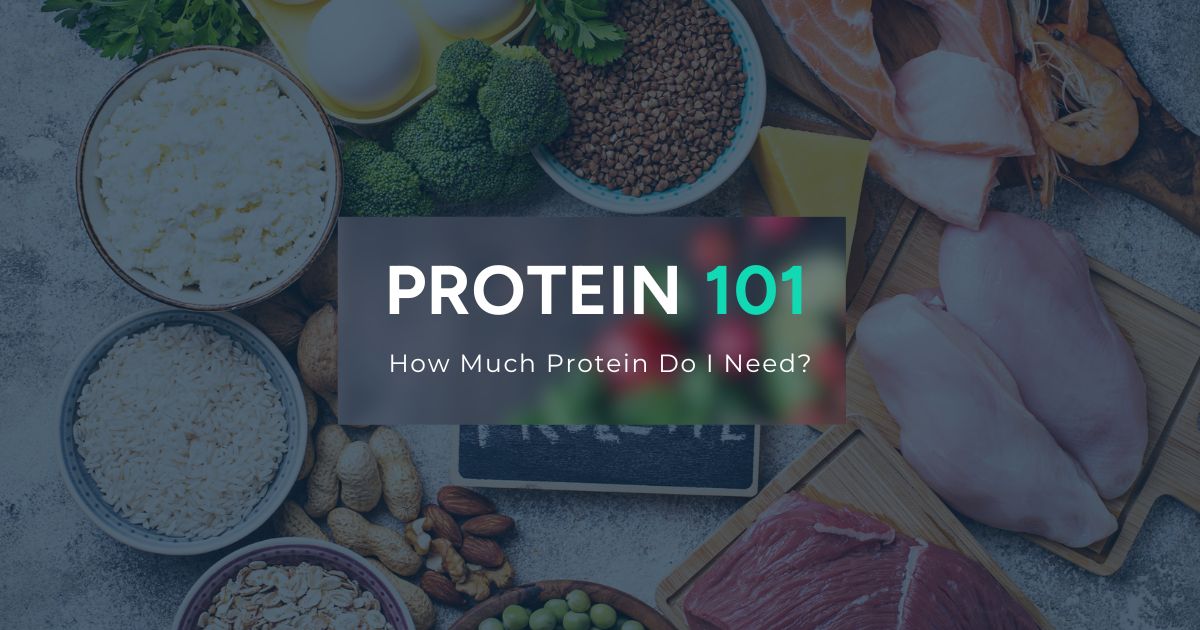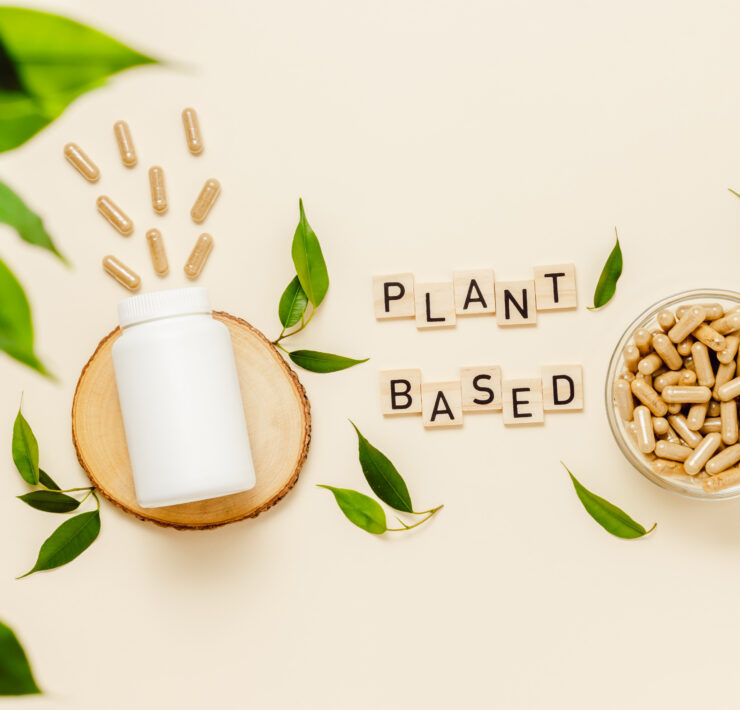Protein 101: How Much Protein Do I Need?

Introduction
As the Founder and CEO of Fit and Sweet, my journey into the world of health and wellness began from a deeply personal place. After battling severe eating issues and a hormonal imbalance that led to unexpected weight gain, I embarked on a transformative journey to reclaim my health. It was through this process that I discovered the fundamental truth: food is not just sustenance; it’s medicine. At the heart of this realization was the critical role of protein.

Protein is much more than a nutrient; it’s a building block of life. Every cell in our body, from our muscles to our enzymes, hormones, and even our immune system, relies on protein to function. But despite its importance, understanding how much protein we truly need, and the best sources to obtain it from can be a complex maze to navigate.
From my sunny kitchen in Miami, where Fit and Sweet took its first breaths, to the wellness activities we organize, my mission has always been to demystify nutrition and make healthy living accessible and enjoyable. This series is a continuation of that mission, focusing on one of the most crucial aspects of nutrition: protein.

Through this series, I aim to guide you through the essentials of protein—what it is, why it’s so important, and how you can ensure you’re getting enough of it to meet your body’s needs. Whether you’re an athlete, someone struggling with health issues like I was, or simply looking to maintain a healthy lifestyle, understanding your protein needs is key to achieving your wellness goals. Let’s embark on this journey together, from my vibrant community in Miami to wherever you call home, to uncover the power of protein in transforming our health and well-being.
Understanding Protein
Let’s dive deeper into understanding what protein is and its indispensable role in our bodies. From the vibrant and health-conscious backdrop of Miami, where wellness isn’t just a practice but a lifestyle, I’ve come to appreciate the nuanced role of protein in our diet.
There are a lot of protein sources. Three of the best sources of protein are whey, egg whites, and collagen. The cost to include them in a finished product is very high because they’re natural, have almost zero processing and are vastly superior to other protein sources.
Dr Ben Bikman, Founder HLTH CODE
Definition of Protein and Its Role in the Body
Protein, at its core, is a macronutrient made up of amino acids, often referred to as the building blocks of life. These amino acids are essential for various bodily functions, including the repair and growth of tissues, the creation of enzymes and hormones, and serving as a vital component in our bones, muscles, cartilage, skin, and blood. Unlike fats and carbohydrates, our body does not store amino acids, which makes regular protein intake crucial to sustaining life and promoting health.
Types of Proteins: Complete, Incomplete, and Complementary
Proteins are classified based on their amino acid composition. Complete proteins contain all nine essential amino acids that our bodies cannot produce on their own. These are typically found in animal products, such as meat, fish, poultry, eggs, and dairy. Incomplete proteins, on the other hand, lack one or more of these essential amino acids and are commonly found in plant-based sources like grains, nuts, and vegetables.
There are a lot of protein sources. Three of the best sources of protein are whey, egg whites, and collagen. The cost to include them in a finished product is very high because they’re natural, have almost zero processing and are vastly superior to other protein sources.
However, the concept of complementary proteins comes into play when combining different plant-based sources of protein that, together, provide all the essential amino acids. This is crucial for those who follow a vegetarian or vegan lifestyle, ensuring they receive a complete protein profile through their diet.
Sources of Protein: Animal vs. Plant-Based
The debate between animal and plant-based proteins centers around not just the completeness of protein but also considerations of health, environmental impact, and ethical concerns. Animal-based proteins are renowned for their complete amino acid profiles and high bioavailability. Yet, they also come with higher levels of saturated fats and cholesterol.
Plant-based proteins, while often incomplete on their own, offer a healthier profile with additional benefits of fiber, vitamins, and minerals, and lower levels of saturated fats. The key to a healthy diet, especially for those emphasizing plant-based sources, is variety. By incorporating a diverse array of plant proteins, one can easily achieve a balanced and complete amino acid intake.

From my personal experience, transitioning to a more plant-forward diet here in Miami, surrounded by an abundance of fresh, local produce, has not only enriched my health but also introduced me to a world of vibrant flavors and textures that celebrate the power of plants. Whether you lean towards animal or plant-based proteins, the goal is to understand their impact on your health and make informed choices that align with your wellness journey.
The Functions of Protein in the Body
Building on our exploration of what proteins are and where they come from, it’s essential to delve into the critical roles they play within our bodies. As I navigated my health journey, transitioning from battling health issues to founding Fit and Sweet in the vibrant, health-conscious community of Miami, the importance of protein in bodily functions became ever more apparent. Here’s how protein serves as a cornerstone of our physical well-being:
Muscle Repair and Growth
Protein is synonymous with muscle repair and growth. This is particularly relevant in the context of exercise and physical activity. When we engage in any form of exercise, especially strength training, our muscle fibers undergo stress, leading to minor damage. Protein steps in as the repairman, fixing these tiny tears and, in the process, building stronger and larger muscles. This function was a revelation for me, as it transformed my understanding of nutrition’s role in fitness and recovery.
Hormone and Enzyme Production
Beyond muscle repair, proteins are fundamental in producing hormones and enzymes – the body’s chemical messengers and catalysts that regulate nearly every biochemical process. Hormones like insulin, necessary for glucose metabolism, and enzymes that facilitate digestion, are all made from protein. This aspect of protein’s role highlights its importance not just in physical health but in maintaining the body’s overall homeostasis and functionality.
Immune System Support
Proteins are also vital in supporting our immune system. Antibodies, a type of protein, play a crucial role in fighting off pathogens like viruses and bacteria. Without sufficient protein intake, our body’s ability to produce these antibodies diminishes, leaving us more susceptible to infections and illnesses. This was a key factor in my health journey, emphasizing the importance of a balanced diet rich in high-quality proteins to maintain robust immune health.
Energy Source When Carbohydrates and Fats Are Not Available
Although proteins are primarily known for their roles in muscle building and repair, they can also serve as an energy source. In the absence of sufficient carbohydrates and fats, the body can convert protein into glucose to meet its energy needs. However, this is not the body’s preferred energy source, as it would rather reserve protein for its other critical functions. This understanding underscores the importance of a well-rounded diet that includes adequate amounts of all macronutrients.
From Miami’s sunny shores to wherever your wellness journey may take you, the multifaceted roles of protein in the body illuminate its indispensable contribution to our health and vitality. Whether it’s through repairing muscles, facilitating biochemical reactions, bolstering our immune system, or providing energy, protein’s impact on our well-being is profound. As we continue this series, keep in mind the importance of incorporating a balanced amount of high-quality protein into your diet to support these essential functions.
Daily Protein Requirements
As we delve deeper into the significance of protein within our diet, understanding just how much protein we need daily becomes crucial. Here’s a closer look at the daily protein requirements and the various factors that influence these needs.
General Guidelines for Protein Intake
The Recommended Dietary Allowance (RDA) for protein is a great starting point to gauge how much protein one should consume daily. The RDA is designed to meet the nutritional needs of nearly all (97-98%) healthy individuals in a specific life stage and gender group. For adults, the general guideline is 0.8 grams of protein per kilogram of body weight per day. This means, that for a person weighing 68 kilograms (150 pounds), the daily protein requirement would be about 54 grams. However, this is just the baseline, and several factors can adjust this requirement upward or downward.
Factors Affecting Protein Needs
- Age: As we age, our bodies become less efficient at processing protein, which may necessitate a higher intake to maintain muscle mass and support overall health.
- Gender: Generally, men may require more protein than women due to having a higher muscle mass, but this can vary greatly depending on individual lifestyle and activity levels.
- Weight: Body weight plays a significant role in determining protein needs. The more you weigh, the more protein your body requires to support the basic functions of your larger mass.
- Activity Level: Individuals who are more active, especially those engaging in regular strength training or endurance sports, have higher protein needs to repair muscle and support growth.
- Health Status: Certain health conditions, such as recovering from surgery or illness, can increase the body’s protein requirements to aid in recovery and repair.
Recommended Dietary Allowance (RDA) for Protein
It’s important to note that the RDA for protein is a general guideline and should be adjusted based on the factors mentioned above. For example, athletes or those engaging in heavy physical activity may benefit from 1.2 to 2.0 grams of protein per kilogram of body weight per day, significantly higher than the general RDA.
In Miami, where the culture often celebrates fitness and outdoor activities, I’ve seen firsthand how a more active lifestyle increases protein needs. The key is to listen to your body and adjust your protein intake to match your lifestyle, goals, and health status. Whether through animal or plant-based sources, ensuring you’re meeting your body’s protein needs is essential for maintaining strength, health, and vitality.
As we navigate our protein intake, it’s also vital to consider the quality of the protein sources. In the next sections, we’ll explore how to balance your protein intake and the importance of incorporating a variety of high-quality protein sources into your diet.
Calculating Your Protein Needs
A critical aspect of this personalized nutrition is understanding how to calculate your specific protein needs based on body weight, activity level, and lifestyle. Let’s break down the steps to calculate your protein requirements and look at examples for different types of individuals.
How to Calculate Protein Needs Based on Body Weight
The basic formula for calculating your daily protein requirement is straightforward:
- Determine your weight in kilograms: If you know your weight in pounds, divide it by 2.2 to convert it to kilograms. For example, if you weigh 150 pounds, your weight in kilograms is approximately 68 kg (150 ÷ 2.2).
- Multiply your weight in kilograms by the recommended protein intake: For the average adult, the Recommended Dietary Allowance (RDA) suggests 0.8 grams of protein per kilogram of body weight.
- Formula: Weight in kilograms × 0.8 (for the average sedentary adult)
Examples of Calculating Protein Needs
- Sedentary Adult: A person weighing 68 kg (150 lbs) would require about 54 grams of protein per day (68 kg × 0.8 g/kg).
- Active Adult: Active adults or those engaged in moderate exercise several times a week may need more protein. For these individuals, protein needs might increase to about 1.1 to 1.4 grams per kilogram. Using the same example of a 68 kg individual, the protein requirement would range from 75 to 95 grams per day (68 kg × 1.1 or 1.4 g/kg).
- Athlete: Athletes or individuals engaging in heavy strength training or endurance sports may need even more protein, ranging from 1.2 to 2.0 grams per kilogram of body weight. For our 68 kg example, this would translate to approximately 82 to 136 grams of protein per day (68 kg × 1.2 to 2.0 g/kg).
These examples highlight the variability in protein needs depending on one’s lifestyle and activity levels. It’s important to note that these calculations provide a starting point. Individual needs may vary based on factors such as age, gender, health status, and specific fitness goals.
Whether you’re a sedentary individual looking to maintain health, an active adult aiming for fitness, or an athlete with performance goals, understanding and adjusting your protein intake is a crucial step in supporting your body’s needs.
As we continue this series, remember that nutrition is not one-size-fits-all. Listening to your body and possibly consulting with a healthcare provider or nutritionist can help fine-tune your diet to ensure you’re getting the right amount of protein to support your health journey.
Signs You Might Not Be Getting Enough Protein
In the vibrant and active lifestyle embraced here in Miami, where wellness is a community affair, recognizing the signs of protein deficiency is essential for maintaining optimal health. My journey from overcoming health challenges to founding Fit and Sweet has taught me the importance of being attuned to my body’s signals. Protein deficiency, though rare in developed countries, can still occur and have significant impacts on health and well-being. Here’s how you can identify the signs of not getting enough protein and understand the potential long-term risks associated with inadequate protein intake.
Physical Symptoms of Protein Deficiency

- Fatigue and Weakness: Protein is crucial for muscle health and energy. A lack of protein can lead to muscle wasting and an overall feeling of weakness, making it hard to perform everyday activities.
- Skin, Hair, and Nail Problems: Protein is vital for the regeneration of cells, which includes those responsible for healthy skin, hair, and nails. Signs of deficiency include thinning hair, brittle nails, and skin rashes.
- Increased Susceptibility to Infections: Proteins play a significant role in immune function. A deficiency can lead to a weakened immune system, making you more prone to infections and illnesses.
- Edema: Protein helps maintain fluid balance in the body. Insufficient protein can lead to edema, characterized by swelling, particularly in the feet, ankles, and legs, due to fluid accumulation.
- Slow Healing of Wounds: Protein’s role in cell regeneration also affects the body’s ability to heal wounds. A lack of protein can slow this process significantly.
Long-term Health Risks Associated with Inadequate Protein Intake
- Loss of Muscle Mass: Over time, a protein deficiency can lead to a loss of muscle mass, which can affect mobility, strength, and overall health.
- Bone Fractures: Protein is important for bone health. Insufficient intake over time can lead to weaker bones and an increased risk of fractures.
- Immune Dysfunction: Chronic protein deficiency can compromise the immune system, making it harder for the body to fight off pathogens and increasing the risk of severe infections.
- Growth and Development Issues: In children, inadequate protein intake can severely affect growth and development, leading to stunted growth, developmental delays, and other health issues.
- Increased Risk of Chronic Diseases: There is also an increased risk of chronic conditions such as heart disease and diabetes with long-term inadequate protein intake.
Recognizing these signs and risks is the first step toward correcting a protein-deficient diet. In my own experience, adjusting my diet to ensure adequate protein intake was pivotal in regaining my health and vitality. Whether through incorporating more high-quality animal or plant-based protein sources, understanding your body’s needs is crucial.
As we continue to explore the role of protein in our diets, remember that the goal is not just to prevent deficiency but to optimize our health and wellness. Listening to our bodies and making informed dietary choices can help us all lead healthier, more vibrant lives.
Risks of Excessive Protein Intake
While we’ve explored the importance of meeting our daily protein requirements, it’s equally crucial to understand that more isn’t always better. Excessive protein intake can lead to several health concerns. Here’s what you need to know about the potential risks associated with consuming too much protein and how to avoid overconsumption.
Potential Health Concerns with Consuming Too Much Protein
- Kidney Strain: High levels of protein can put additional strain on the kidneys over time, particularly in individuals with pre-existing kidney conditions. The kidneys have to work harder to eliminate the byproducts of protein metabolism, which can exacerbate kidney problems.
- Dehydration: The process of metabolizing protein requires more water, which can lead to dehydration if adequate fluids are not consumed. This is particularly crucial in warmer climates like Miami’s.
- Digestive Issues: Excessive protein, especially from animal sources, can lead to digestive discomfort, including constipation and bloating. This is often due to the high amounts of protein displacing fiber-rich foods essential for digestive health.
- Heart Health: Diets high in red and processed meats, which are protein-rich, have been linked to increased risks of heart disease. This is attributed to high levels of saturated fats and cholesterol in these foods.
- Bone Health: There’s some evidence suggesting that very high-protein diets can lead to a loss of calcium through urine, potentially impacting bone density over time. However, this risk appears to be mitigated by consuming adequate calcium alongside protein.
How to Avoid Overconsumption of Protein
- Balance Your Diet: Ensure your diet is balanced with adequate amounts of carbohydrates and fats, alongside protein. Fruits, vegetables, whole grains, and healthy fats are essential for a well-rounded diet.
- Know Your Needs: Be aware of your personal protein needs based on your activity level, health status, and body weight. Avoid consuming significantly more than what’s recommended for your lifestyle.
- Choose Quality Over Quantity: Opt for high-quality protein sources that also offer other nutrients. Plant-based proteins, lean meats, and fish are excellent choices that provide protein without excessive fats.
- Listen to Your Body: Pay attention to how your body responds to your diet. Signs of discomfort or health issues may indicate the need to adjust your protein intake.
- Consult with Professionals: If you’re unsure about your dietary needs, consulting with a dietitian or healthcare provider can provide personalized advice tailored to your health and fitness goals.
Understanding that our bodies require a harmonious blend of all macronutrients, including protein, helps us navigate toward optimal health without falling into the trap of excess. Remember, the goal is to nourish our bodies and support our lifestyles in a sustainable, healthy manner.
Tips for Meeting Your Protein Needs
Ensuring you meet your daily protein needs doesn’t have to be a complex puzzle. Living in a wellness-oriented city like Miami has taught me that incorporating sufficient protein into your diet can be both simple and delicious. Here are some straightforward tips and strategies to help you meet your protein requirements effectively:
Strategies for Incorporating Sufficient Protein
- Distribute Protein Evenly Across Meals: Instead of loading all your protein into one meal, spread it out to improve absorption and utilization by your body throughout the day.
- Use Protein Supplements Wisely: While whole foods are the best source of nutrients, quality protein powders can be a convenient supplement for those struggling to meet their protein needs through diet alone.
Importance of Protein Quality Over Quantity
- Opt for Lean and High-Quality Sources: High-quality proteins contain all the essential amino acids your body needs. Opt for lean meats, fish, dairy, beans, lentils, and a variety of plant-based proteins to cover the spectrum of amino acids.
- Consider the Nutritional Package: Choose protein sources that come with additional health benefits, such as fiber, vitamins, and minerals, without excessive saturated fats and calories.
Ideas for Protein-Rich Meals and Snacks
- Breakfast: Start your day with Greek yogurt topped with nuts and berries, or a smoothie with protein powder, spinach, and fruit.
- Lunch and Dinner: Incorporate a palm-sized portion of protein like grilled chicken, fish, tofu, or beans into your salads, bowls, or stir-fries. Quinoa is a great plant-based protein to add to your meals.
- Snacks: Keep hard-boiled eggs, cottage cheese, protein bars (watch for added sugars), or a handful of almonds handy for a quick protein boost.

Incorporating these tips into your daily routine can make meeting your protein needs simple, enjoyable, and delicious. Remember, the focus should always be on the quality of the protein you consume and ensuring it fits into a balanced, nutrient-dense diet that supports your overall health and wellness goals.
Conclusion
As we wrap up our exploration of protein’s essential role in health and wellness, it’s clear that understanding and meeting your protein needs is a key component of a balanced diet. But the journey doesn’t stop here. To dive deeper into making informed choices about the proteins you incorporate into your diet, our series continues with more focused discussions.
Next, we invite you to explore “Choosing Your Protein: Animal vs. Plant-Based Showdown,” where we delve into the nuances between different protein sources. This article will compare the nutritional profiles, health benefits, and environmental impacts of animal versus plant-based proteins. It’s an opportunity to further understand how your dietary choices align with your health goals and ethical considerations.
Moreover, this series aims to not only educate but also to highlight sustainable and health-conscious choices. With a spotlight on Owyn Protein, we’ll explore how opting for high-quality, sustainable protein sources can contribute to your wellness journey and the planet’s health.
We encourage you to continue with us as we uncover the complexities of protein in our diets. Whether you’re curious about the best protein sources for your lifestyle or looking to make more environmentally friendly dietary choices, there’s much more to learn. By expanding your knowledge through our series, you’ll be better equipped to make dietary decisions that support both your health and the well-being of our environment. Join us as we continue to navigate the world of protein with curiosity and mindfulness.







